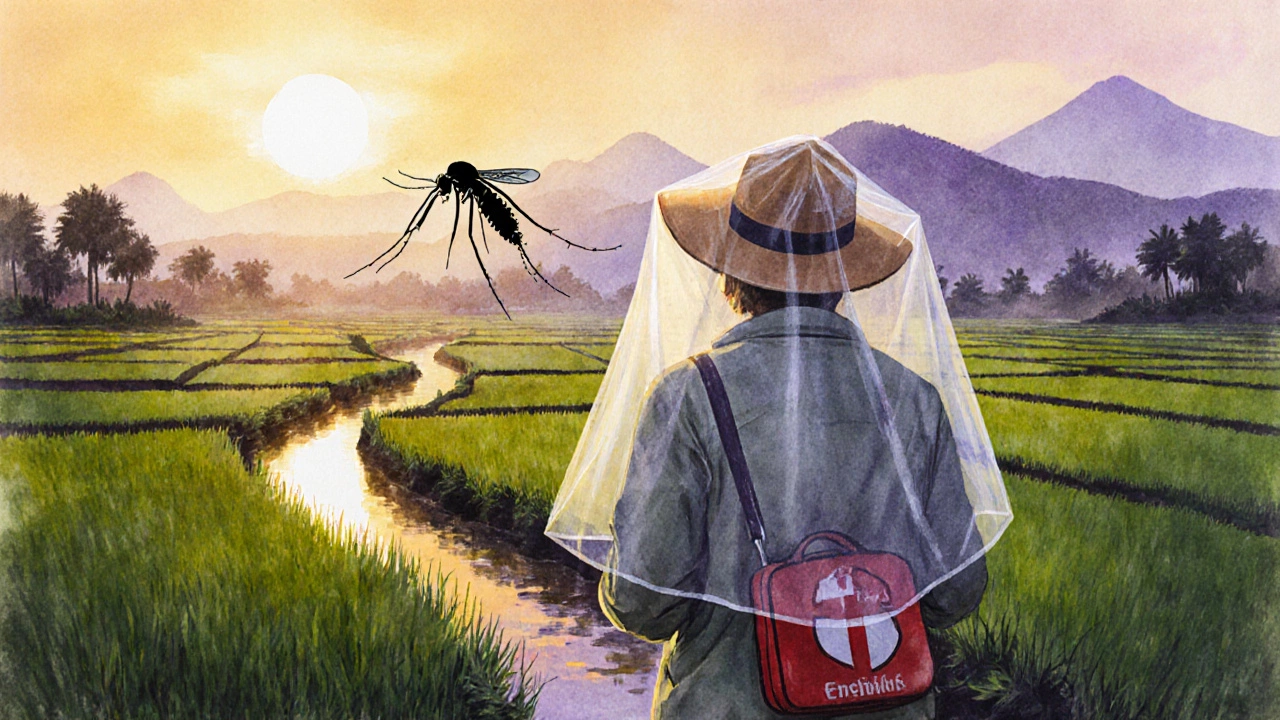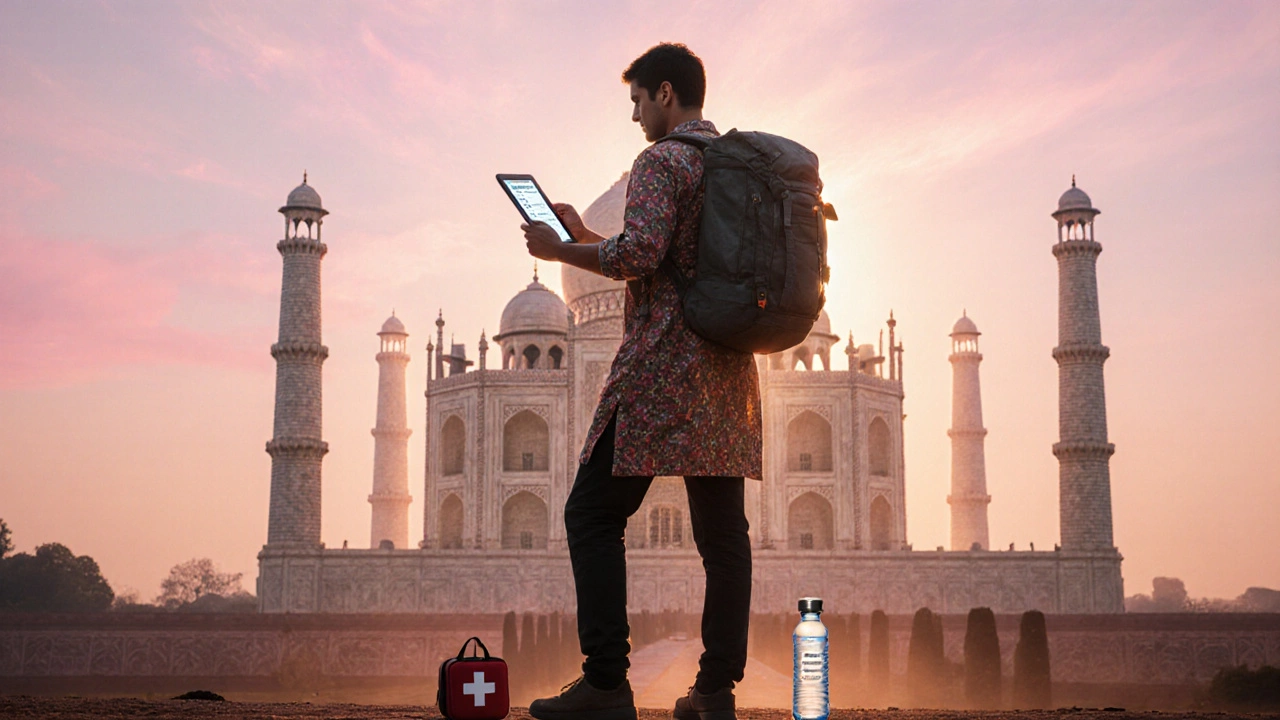India Vaccination Cost Calculator
Travel Details
Tell us about your trip so we can recommend the right vaccines.
Your Vaccination Plan
Select your travel details above to see your personalized vaccination recommendations.
Quick Takeaways
- Core vaccines (Hepatitis A, Typhoid, Tetanus, Polio) are strongly recommended for almost all travelers.
- Japanese Encephalitis, Rabies, and Yellow Fever are optional and depend on region, activity, and length of stay.
- Plan your shots 4‑8 weeks before departure; many can be combined in a single visit to a travel clinic.
- Budget‑friendly options exist: government health services, bulk‑price packages, and reputable low‑cost pharmacies.
- Carry your International Certificate of Vaccination (ICV) and a copy of your health record.
India is a South Asian country with a diverse climate and a travel population of over 30million tourists each year. Its sheer size means disease risk varies from the Himalayan north to the tropical south. Knowing which India vaccinations you truly need can save you money, protect your health, and keep your itinerary on track.
Why Vaccinations Matter for India
Travel‑related illness isn’t just about feeling sick; it can derail plans, cost extra hospital fees, and in worst‑case scenarios, become life‑threatening. The World Health Organization (WHO) reports that water‑borne and vector‑borne diseases account for roughly 40% of all travel‑related infections in South Asia. Understanding the local epidemiology helps you target the right shots.
Core Recommended Vaccines
The following vaccines are considered essential for most visitors, regardless of budget level.
- Hepatitis A is a liver infection spread through contaminated food or water. The vaccine is a two‑dose series, usually given 6 months apart, and costs around NZD70-90 per course.
- Typhoid protects against Salmonella Typhi, which thrives in areas with poor sanitation. A single‑shot formulation (Typhoid Vi) costs about NZD60, while the oral regimen is slightly cheaper but requires four capsules.
- Tetanus‑diphtheria‑pertussis (Tdap) safeguards against the bacteria that cause tetanus, diphtheria, and whooping cough. Most travelers receive a booster if their last dose was over 10years ago; price is roughly NZD30-45.
- Polio remains a concern in some rural pockets of India. An inactivated polio vaccine (IPV) booster is cheap (NZD20) and often combined with the Tdap shot.
- COVID‑19 booster doses are still advised for international travelers, especially if you’re not fully up‑to‑date. Local health ministries may require proof of a recent shot for entry into certain states or venues.
These five vaccines form the backbone of a safe, budget‑conscious India trip.

Optional or Region‑Specific Shots
If your itinerary includes rural or forested areas, adventure activities, or extended stays, consider the following add‑ons.
- Japanese Encephalitis (JE) is a mosquito‑borne virus prevalent in northeastern states, the Western Ghats, and parts of the Himalayas. Two doses spaced 28days apart cost about NZD150 total. It’s worth it if you’ll be in rice‑field regions for more than a month.
- Rabies vaccine is recommended for travelers who may encounter stray dogs, wildlife, or who plan long trekking trips. A pre‑exposure series (three shots) runs NZD250-300.
- Yellow Fever is not endemic to India, but some airlines and neighboring countries (e.g., Nepal) may require a certificate if you’re arriving from a yellow‑fever‑risk nation. The single‑dose vaccine costs roughly NZD120.
Decide based on your route, activities, and personal risk tolerance.
How to Plan Your Vaccination Schedule
- List every city, state, and activity you intend to do.
- Match that list against the disease risk table below.
- Book a consultation with a travel‑medicine clinic 4‑8weeks before departure. This window allows for multi‑dose vaccines and any needed boosters.
- Ask the clinician about combination shots (e.g., Tdap+Polio) to reduce the number of visits.
- Purchase a waterproof International Certificate of Vaccination (ICV) and keep a digital copy on your phone.
Budget‑Friendly Tips for Getting Vaccinated
- Use public health services. In NewZealand, regional health boards often provide hepatitis A and typhoid at subsidized rates for travelers.
- Shop group discounts. Some travel clinics offer a 10% discount if you book for three or more people.
- Check university health centers. Many universities run low‑cost travel‑medicine clinics for students and alumni.
- Combine trips. If you’re heading to another Asian country shortly after India, a single clinic visit can cover vaccines for both destinations.
- Consider reputable online pharmacies. For vaccines like hepatitis A, you can order the dose to be administered at a local clinic, saving on travel fees.

Quick Comparison Table
| Vaccine | Recommended For | Typical Cost (NZD) | Doses Required |
|---|---|---|---|
| HepatitisA | All travelers | 70‑90 | 2 (0&6mo) |
| Typhoid | Backpackers, food‑adventure seekers | 60 (injectable) / 45 (oral) | 1‑4 (depends) |
| Tdap/Polio | Anyone >10years since last booster | 30‑45 (Tdap) + 20 (Polio) | 1 |
| COVID‑19 booster | All travelers | ~25 (depends on brand) | 1 |
| Japanese Encephalitis | Rural/monsoon‑season stays >1mo | 150 | 2 |
| Rabies (pre‑exposure) | Animal‑contact activities, long treks | 250‑300 | 3 |
| Yellow Fever | Transit from risk countries | 120 | 1 |
Pre‑Travel Checklist
- Confirm vaccine dates and obtain the ICV.
- Carry a copy of your medical history (allergies, chronic meds).
- Pack a small first‑aid kit (antiseptic wipes, rehydration salts).
- Buy bottled water or a portable UV purifier for the first few days.
- Check local health alerts on the Ministry of Health India website a week before departure.
Frequently Asked Questions
Do I need any vaccines if I’m only staying in big cities like Delhi or Mumbai?
Even in major metros, hepatitisA and typhoid are advised because food‑borne illnesses can happen anywhere. A Tdap booster is also recommended if your last dose was over a decade ago.
Can I get vaccines after I arrive in India?
Yes, major cities have reputable private hospitals offering travel‑medicine services, but you’ll lose valuable time and may need multiple visits for multi‑dose vaccines. It’s far cheaper and safer to complete them before you leave.
What if I’m on a shoestring budget and can’t afford all the recommended shots?
Prioritise hepatitisA, typhoid, and a Tdap booster-these cover the biggest risks. Look for bulk packages or public‑health subsidies for the rest, and practice strict food‑and‑water safety.
Is the yellow‑fever certificate ever required for India?
India itself doesn’t require it, but airlines or neighboring countries may demand proof if you’re transiting from a yellow‑fever‑endemic nation. Keep the certificate handy just in case.
How long before travel should I get my vaccines?
Aim for 4‑8weeks ahead. This window covers the two‑dose series for hepatitisA and JE, and ensures any boosters are fully effective.
Next Steps & Troubleshooting
If you run into any of these scenarios, here’s a quick fix:
- Missed the 8‑week window? Book the fastest‑available clinic; some offer accelerated schedules (e.g., hepatitisA in a single high‑dose shot).
- Allergic reaction to a vaccine? Inform the clinic beforehand; they can provide an alternative formulation or pre‑medicate under supervision.
- Lost your ICV? Most clinics can issue a replacement within 24hours. Keep a digital photo as backup.
- Budget overruns? Re‑evaluate optional shots-Rabies and JE can be postponed if you’ll stay in urban hubs only.
With the right preparation, you’ll dodge the common health hiccups and enjoy India’s vibrant culture, cuisine, and landscapes without a costly medical detour.
